2012考研完型填空讲义 2011-4
- 格式:docx
- 大小:123.78 KB
- 文档页数:61
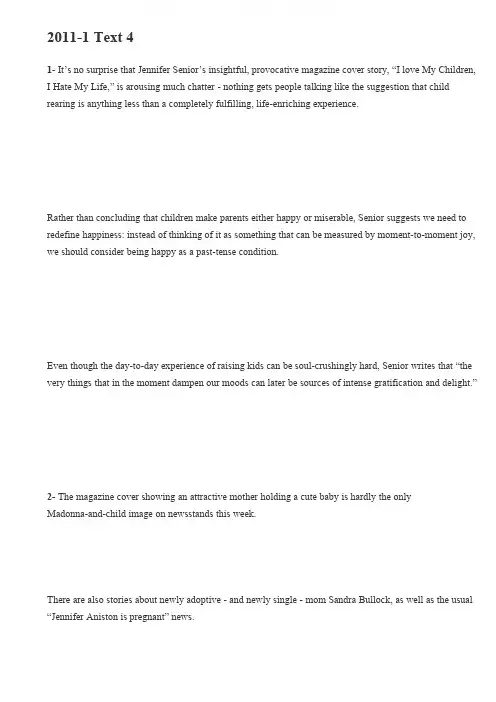
百度官方认证店铺:考研资料2011-1Text41-It’s no surprise that Jennifer Senior’s insightful,provocative magazine cover story,“I love My Children, I Hate My Life,”is arousing much chatter-nothing gets people talking like the suggestion that child rearing is anything less than a completely fulfilling,life-enriching experience.Rather than concluding that children make parents either happy or miserable,Senior suggests we need to redefine happiness:instead of thinking of it as something that can be measured by moment-to-moment joy, we should consider being happy as a past-tense condition.Even though the day-to-day experience of raising kids can be soul-crushingly hard,Senior writes that“the very things that in the moment dampen our moods can later be sources of intense gratification and delight.”2-The magazine cover showing an attractive mother holding a cute baby is hardly the onlyMadonna-and-child image on newsstands this week.There are also stories about newly adoptive-and newly single-mom Sandra Bullock,as well as the usual “Jennifer Aniston is pregnant”news.分享考研资料,助力考研成功!。
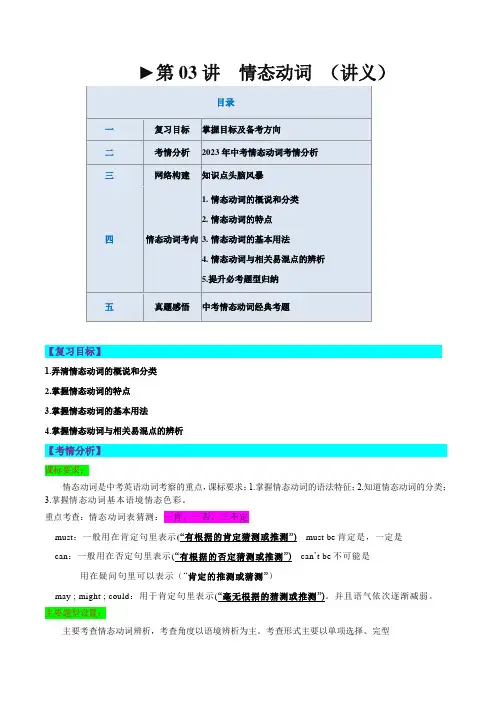
►第03讲情态动词(讲义)目录一复习目标掌握目标及备考方向二考情分析2023年中考情态动词考情分析三网络构建知识点头脑风暴四情态动词考向1.情态动词的概说和分类2.情态动词的特点3.情态动词的基本用法4.情态动词与相关易混点的辨析5.提升必考题型归纳五真题感悟中考情态动词经典考题【复习目标】1.弄清情态动词的概说和分类2.掌握情态动词的特点3.掌握情态动词的基本用法4.掌握情态动词与相关易混点的辨析【考情分析】课标要求:情态动词是中考英语动词考察的重点,课标要求:1.掌握情态动词的语法特征;2.知道情态动词的分类;3.掌握情态动词基本语境情态色彩。
重点考查:情态动词表猜测:一肯、一否、三不定must:一般用在肯定句里表示(“有根据的肯定猜测或推测”)must be肯定是,一定是can:一般用在否定句里表示(“有根据的否定猜测或推测”)can’t be不可能是用在疑问句里可以表示(“肯定的推测或猜测”)may ; might ; could:用于肯定句里表示(“毫无根据的猜测或推测”)。
并且语气依次逐渐减弱。
主要题型设置:主要考查情态动词辨析,考查角度以语境辨析为主。
考查形式主要以单项选择、完型填空、短文填空及语法填空为主。
情态动词题型命题规律【网络构建】情态动词是初中英语里的一个重要的语法项目,也是全国各省市中考试题的考查热点。
在备战2024年中考时,考生要牢记情态动词的结构和意义以及其表示推测时的用法,多做练习,在实践中加以区分。
(一)概说情态动词表示说话人的语气和观点.情态动词有一定的词义,但不能单独作谓语,它必须和表示动作或状态的不带to 的不定式(ought 除外)连用,构成复合谓语.情态动词只有情态意义,即它表示说话人对动作的观点,如需要、可能、意愿或怀疑等.情态动词主要有:can(could),may(might),must, ought to, need, dare(dared), have to(had to).此外shall, will, should, would 在一定场合下也可用作情态动词.(二)情态动词的分类:(1)只作情态动词:must;can/could;may/might;ought to(2)既可作情态动词又可作实义动词:need,dare(3)既可作情态动词又可作助动词:shall/should;will/would(4)具有情态动词某些特征:have/had to;had better考向二 情态动词的特点(1)情态动词无人称和数的变化(have to 除外);(2)情态动词后接动词原形;(3)情态动词的否定式是在其后加not; have to 除外(4)具有助动词的作用,可用来构成否定句、疑问句及用于简明答语;(5)个别情态动词有现在式和过去式两种形式,过去式用来表达更加客气、委婉的语气,时态性不强,可用于过去、现在或将来。
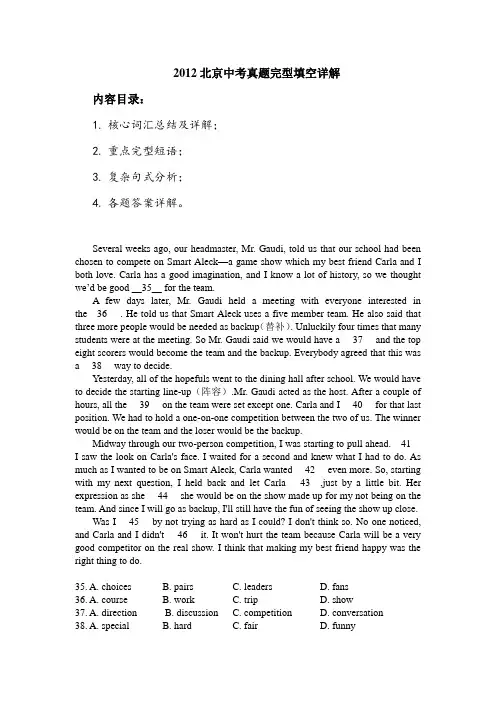
2012北京中考真题完型填空详解内容目录:1.核心词汇总结及详解;2.重点完型短语;3.复杂句式分析;4.各题答案详解。
Several weeks ago, our headmaster, Mr. Gaudi, told us that our school had been chosen to compete on Smart Aleck—a game show which my best friend Carla and I both love. Carla has a good imagination, and I know a lot of history, so we thought we’d be good __35__ for the team.A few days later, Mr. Gaudi held a meeting with everyone interested in the__36__ . He told us that Smart Aleck uses a five member team. He also said that three more people would be needed as backup(替补). Unluckily four times that many students were at the meeting. So Mr. Gaudi said we would have a __37__ and the top eight scorers would become the team and the backup. Everybody agreed that this was a __38__ way to decide.Yesterday, all of the hopefuls went to the dining hall after school. We would have to decide the starting line-up(阵容).Mr. Gaudi acted as the host. After a couple of hours, all the __39__ on the team were set except one. Carla and I __40__ for that last position. We had to hold a one-on-one competition between the two of us. The winner would be on the team and the loser would be the backup.Midway through our two-person competition, I was starting to pull ahead.__41__ I saw the look on Carla's face. I waited for a second and knew what I had to do. As much as I wanted to be on Smart Aleck, Carla wanted __42__ even more. So, starting with my next question, I held back and let Carla __43__,just by a little bit. Her expression as she __44__ she would be on the show made up for my not being on the team. And since I will go as backup, I'll still have the fun of seeing the show up close.Was I __45__ by not trying as hard as I could? I don't think so. No one noticed, and Carla and I didn't __46__ it. It won't hurt the team because Carla will be a very good competitor on the real show. I think that making my best friend happy was the right thing to do.35. A. choices B. pairs C. leaders D. fans36. A. course B. work C. trip D. show37. A. direction B. discussion C. competition D. conversation38. A. special B. hard C. fair D. funny39. A. places B. rules C. names D. orders40. A. tied B. clapped C. cried D. returned41. A. Still B. Never C. Then D. Again42. A. us B. it C. me D. her43. A. wait B .turn C. move D. win44. A. accepted B. realized C. considered D. decided45. A. coming B. refusing C. helping D. cheating46. A. mean B. plan C. regret D. say核心词汇:1. choose v. 选择(chose , chosen )n. choiceeg. Will you please give me some advice on what books to choose?In this case, we have no choice.2. compete v. 竞争,比赛n. competition adj. competitive 竞争的,有竞争力的eg. It’s important to learn how to survive and compete in social life(社会生活).A lot of students enter for(报名参加) the singing competition.If we want to stay competitive, we have to modernize(使现代化) our factory. 3. imagine v. 想象n. imagination 想象,想象力eg. Can you imagine what your life will be like in twenty years?Mary enjoys writing because she has plenty of imagination.4. score n. 分数v. 得分,记分eg. She wonders how to get a high score in the test.5. agree v. 同意(1)agree to do sth. 同意做某事(2)agree with sb. 同意某人(话、意见); (气候、食物等)相宜,适宜,适合(某人)的健康(或体质)eg. I agree with what you said just now.The climate doesn’t agree with me.(3) agree on sth. 在某事上达成一致意见disagree v. 不同意agreeable adj. 令人愉快的,适合的eg. Smiles make life agreeable.6. decide v. 决定,下决心n. decisiondetermined adj. 下定决心的,坚决的(1) decide to do sth. 决定/ 下决心做某事(2) make a decision to do sth.(3) make up one’s mind to do sth.(4) be determined to do sth.7. hopeful adj. 有希望的hope v. 希望(1)hope to do sth. 希望做某事I hope to travel around the world some day.(2)hope that + 从句My parents hope that I can have a good grade in the exam.不能表达为:My parents hope me to have a good grade in the exam. (wrong)【构词法】-ful 形容词词缀(v. + ful = adj. )use usefulhelp helpfulwonder wonderful8. position n. 位置,职位v. 安置,把放在位置eg. Do you think you are qualified for(胜任) the position?9. expression n. 表达,表现,表情facial expression 面部表情express v. 表达;adj. 迅速的,专门的n. 快递express way 高速公路eg. Teachers should encourage students to express themselves freely.10. lead v. 领导,引导;(led)leader n. 领导者eg. He led me into his room and hurriedly hid a parcel under the desk.lead a happy life 过着幸福的生活lead to 导致,通向eg. Hard work leads to success.leading adj. 主要的,领先的leading technology 领先技术leading part 主要角色11. course n. 课程;过程;跑道;一道菜12. discussion n. 讨论have a discussion about sth.discuss v.13. direction14. special adj. 特别的,专门的specialist n. 专家,专门医师15. fair adj. 公平的;晴朗的n. 集市,展览会unfair 不公平的fairly 相当地16. order v.命令,订购n. 命令,顺序eg. Are you ready to order?I have been working to get my room in order.in order 整齐有序out of order 无序的,坏了order sb. to do sth.17. tie v. 系;与成平局; 与紧密联系n. 领带;平局;联系eg. He tied the dog to one of the trees.The result of the competition was a tie.My social life and business are closely tied.I can’t find any tie between her and the town.19. move v. 移动;感动;搬家move to +地点搬家到eg. A traffic policeman asks him to move his car.The story surprises and moves me.I’m deeply moved by what he has done.20. return v. 返回;归还n. 报答return to + 地点= come/ go back to + 地点回到某地return sth to sb. 把某物归还某人= give sth. back to sb.21. accept v. 接受,承认eg. I wonder whether I should accept her gift.accept the responsibility 承担责任receive v. 收到,接待receive a letter from sb. 收到某人的来信22. realize v. 实现;意识到,了解realize one’s dream 实现某人的梦想eg. They don’t realize one important thing.23. consider v. 考虑(=think about);认为(think of)consider doing 考虑做某事consider to be 认为是eg. What do you consider to be your greatest success?They are considering buying an expensive car.24. refuse v. 拒绝refuse to do sth 拒绝做某事eg. He’ll be angry if you refuse his invitation.The clock refused to welcome New Year.25. cheat v. 欺骗,作弊eg. Some students may cheat in order to get into top schools.It’s not right to cheat others.26. mean v. 意思是;意味着;意欲,打算adj. 不友好的,吝啬的mean to do sth. 打算做某事mean doing sth. 意味着做某事27. regret v. 遗憾,后悔regret to do sth. 很遗憾要做某事regret doing sth. 后悔做某事regretful adj. 后悔的,遗憾的【短语】1. act as 担当(职位),扮演角色2. a couple of 三两个;一对3. pull ahead 领先4. hold back 犹豫,退缩;抑制,克制5. make up (1) 组成(2)编造(3)弥补(4)化妆6. try hard 尽力,努力【复杂句式】1. Several weeks ago, our headmaster, Mr. Gaudi, told us that our school had been chosen to compete on Smart Aleck—a game show which my best friend Carla and I both love.our school had been chosen to compete on Smart Aleck 作told 的宾语从句,had been chosen过去完成时的被动语态, “已经被选择”;a game show 解释了Smart Aleck “一个游戏节目”;which my best friend Carla and I both love. 作game show的定语从句“我的朋友和我都喜欢的游戏节目。
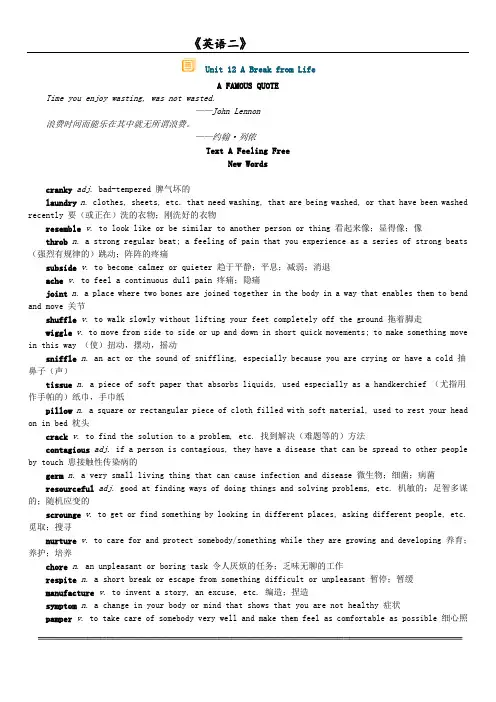
Unit 12 A Break from LifeA FAMOUS QUOTETime you enjoy wasting, was not wasted.——John Lennon浪费时间而能乐在其中就无所谓浪费。
——约翰·列侬Text A Feeling FreeNew Wordscranky adj. bad-tempered 脾气坏的laundry n. clothes, sheets, etc. that need washing, that are being washed, or that have been washed recently 要(或正在)洗的衣物;刚洗好的衣物resemble v. to look like or be similar to another person or thing 看起来像;显得像;像throb n. a strong regular beat; a feeling of pain that you experience as a series of strong beats (强烈有规律的)跳动;阵阵的疼痛subside v. to become calmer or quieter 趋于平静;平息;减弱;消退ache v. to feel a continuous dull pain 疼痛;隐痛joint n. a place where two bones are joined together in the body in a way that enables them to bend and move 关节shuffle v. to walk slowly without lifting your feet completely off the ground 拖着脚走wiggle v. to move from side to side or up and down in short quick movements; to make something move in this way (使)扭动,摆动,摇动sniffle n. an act or the sound of sniffling, especially because you are crying or have a cold 抽鼻子(声)tissue n. a piece of soft paper that absorbs liquids, used especially as a handkerchief (尤指用作手帕的)纸巾,手巾纸pillow n. a square or rectangular piece of cloth filled with soft material, used to rest your head on in bed 枕头crack v. to find the solution to a problem, etc. 找到解决(难题等的)方法contagious adj. if a person is contagious, they have a disease that can be spread to other people by touch 患接触性传染病的germ n. a very small living thing that can cause infection and disease 微生物;细菌;病菌resourceful adj. good at finding ways of doing things and solving problems, etc. 机敏的;足智多谋的;随机应变的scrounge v. to get or find something by looking in different places, asking different people, etc. 觅取;搜寻nurture v. to care for and protect somebody/something while they are growing and developing 养育;养护;培养chore n. an unpleasant or boring task 令人厌烦的任务;乏味无聊的工作respite n. a short break or escape from something difficult or unpleasant 暂停;暂缓manufacture v. to invent a story, an excuse, etc. 编造;捏造symptom n. a change in your body or mind that shows that you are not healthy 症状pamper v. to take care of somebody very well and make them feel as comfortable as possible 细心照顾;精心护理;娇惯;纵容hermit n. a person who, usually for religious reasons, lives a very simple life alone and does not meet or talk to other people 隐士;隐修者;遁世者gel n. a thick substance like jelly, especially one used in products for the hair or skin 凝胶,冻胶(尤指用于头发或护肤的产品)hearty adj. large;making you feel full 大的;丰盛的chamomile n. a plant with a sweet smell and small white and yellow flowers 苹果菊;春黄菊;甘菊vanilla-scented adj. flavoured with vanilla 香草味的gingerly adv. in a careful way, because you are afraid of being hurt, of making a noise, etc. 谨慎地;小心翼翼地;轻手轻脚地grateful adj. feeling or showing thanks because somebody has done something kind for you or has done as you asked 感激的;表示感谢的spa n. a good bath for relaxation or invigoration水疗tub n. a large, long container that you put water in and then get into to wash your whole body 浴缸;浴盆drain n. a pipe that carries away dirty water or other liquid waste 下水道;排水管refresh v. to make somebody feel less tired or less hot 使恢复精力;使凉爽emotionally adv. in the way connected with people's feelings 感情上地;情感上地empower v. to give somebody more control over their own life or the situation they are in 增加(某人的)自主权;使控制局势permission n. the act of allowing somebody to do something, especially when this is done by somebody in a position of authority 准许;许可;批准justify v. to give an explanation or excuse for something or for doing something 对…作出解释;为…辩解(或辩护)awareness n. knowing something;knowing that something exists and is important 知道;认识;意识Phrases and Expressionspile up to become larger in quantity or amount 堆积;积压come down with to get an illness that is not very serious 患,得,染上(小病)slip away to stop existing; to disappear or die 消失;消亡;死去respond to to do something as a reaction to something that somebody has said or done 作出反馈;响应care for to look after somebody who is sick, very old, very young, etc. 照顾,照料(病、老、幼者等)tend to to care for somebody or something 照料;照管;护理重点词汇laundry n. clothes, sheets, etc. that need washing, that are being washed, or that have been washed recently 要(或正在)洗的衣物;刚洗好的衣物eg: She did the laundry (= washed the clothes etc.) and hung it out to dry. 她洗完衣服,挂在外面晒干。
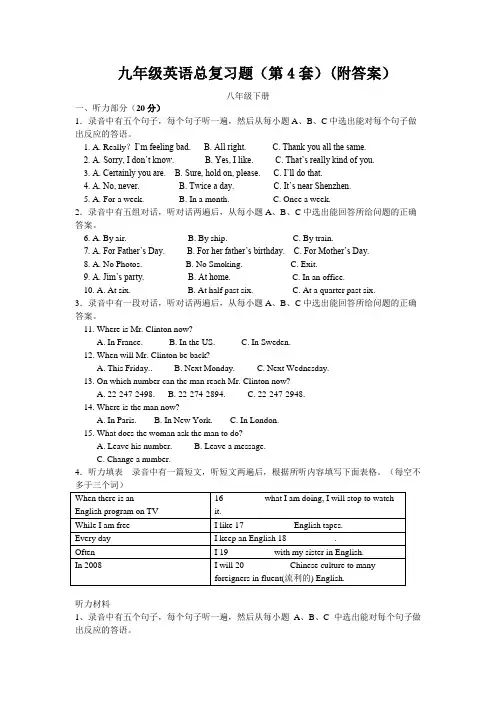
九年级英语总复习题(第4套)(附答案)八年级下册一、听力部分(20分)1.录音中有五个句子,每个句子听一遍,然后从每小题A、B、C中选出能对每个句子做出反应的答语。
1. A. Really?I’m feeling bad. B. All right. C. Thank you all the same.2. A. Sorry, I don’t know. B. Yes, I like. C. That’s really kind of you.3. A. Certainly you are. B. Sure, hold on, please. C. I’ll do that.4. A. No, never. B. Twice a day. C. It’s near Shenzhen.5. A. For a week. B. In a month. C. Once a week.2.录音中有五组对话,听对话两遍后,从每小题A、B、C中选出能回答所给问题的正确答案。
6. A. By air. B. By ship. C. By train.7. A. For Father’s Day. B. For her father’s birthday. C. For Mother’s Day.8. A. No Photos. B. No Smoking. C. Exit.9. A. Jim’s party. B. At home. C. In an office.10. A. At six. B. At half past six. C. At a quarter past six.3.录音中有一段对话,听对话两遍后,从每小题A、B、C中选出能回答所给问题的正确答案。
11. Where is Mr. Clinton now?A. In France.B. In the US.C. In Sweden.12. When will Mr. Clinton be back?A. This Friday..B. Next Monday.C. Next Wednesday.13. On which number can the man reach Mr. Clinton now?A. 22-247-2498.B. 22-274-2894.C. 22-247-2948.14. Where is the man now?A. In Paris.B. In New York.C. In London.15. What does the woman ask the man to do?A. Leave his number.B. Leave a message.C. Change a number.4.听力填表录音中有一篇短文,听短文两遍后,根据所听内容填写下面表格。
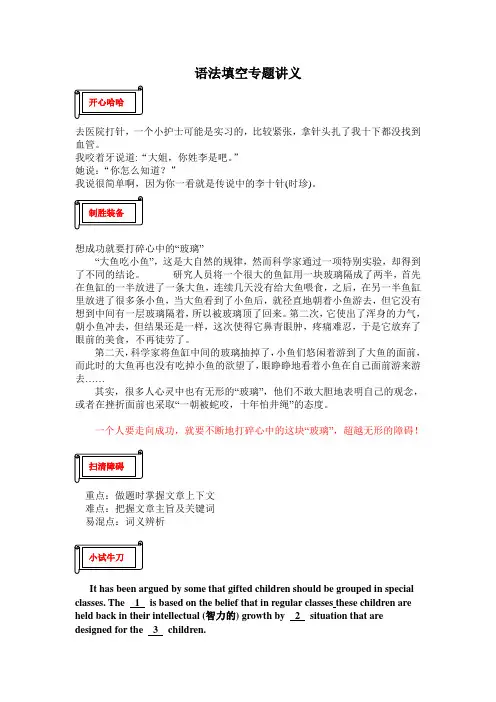
语法填空专题讲义去医院打针,一个小护士可能是实习的,比较紧张,拿针头扎了我十下都没找到血管。
我咬着牙说道:“大姐,你姓李是吧。
”她说:“你怎么知道?”我说很简单啊,因为你一看就是传说中的李十针(时珍)。
想成功就要打碎心中的“玻璃”“大鱼吃小鱼”,这是大自然的规律,然而科学家通过一项特别实验,却得到了不同的结论。
研究人员将一个很大的鱼缸用一块玻璃隔成了两半,首先在鱼缸的一半放进了一条大鱼,连续几天没有给大鱼喂食,之后,在另一半鱼缸里放进了很多条小鱼,当大鱼看到了小鱼后,就径直地朝着小鱼游去,但它没有想到中间有一层玻璃隔着,所以被玻璃顶了回来。
第二次,它使出了浑身的力气,朝小鱼冲去,但结果还是一样,这次使得它鼻青眼肿,疼痛难忍,于是它放弃了眼前的美食,不再徒劳了。
第二天,科学家将鱼缸中间的玻璃抽掉了,小鱼们悠闲着游到了大鱼的面前,而此时的大鱼再也没有吃掉小鱼的欲望了,眼睁睁地看着小鱼在自己面前游来游去……其实,很多人心灵中也有无形的“玻璃”,他们不敢大胆地表明自己的观念,或者在挫折面前也采取“一朝被蛇咬,十年怕井绳”的态度。
一个人要走向成功,就要不断地打碎心中的这块“玻璃”,超越无形的障碍! 重点:做题时掌握文章上下文难点:把握文章主旨及关键词易混点:词义辨析It has been argued by some that gifted children should be grouped in special classes. The 1 is based on the belief that in regular classes these children are held back in their intellectual (智力的) growth by 2 situation that aredesigned for the 3 children.There can be little doubt that 4 classes can help the gifted children to graduate earlier and take their place in life sooner. However, to take these 5 out of the regular classes may create serious problems.I observed a number of 6 children who were taken out of a special class and placed in 7 class. In the special class, they showed little ability to use their own judgment, relying 8 on their teachers’ directions. In th e regular class, having no worry about keeping up, they began to reflect 9 on many problems, some of which were not on the school program.Many are concerned that gifted children become 10 and lose interest in learning. However this 11 is more often from parents and teachers than from students, and some of these 12 simply conclude that special classes should be set up for those who are 13 . Some top students do feel bored in class, but why they 14 so goes far beyond the work they have in school. Studies have shown that to be bored is to be anxious. The gifted child who is bored is an 15 child. (2011广东高考题)1. A. principle B. theory C. arguments D. classification2. A. designing B. grouping C. learning D. living3. A. smart B. curious C. mature D. average4. A. regular B. special C. small D. creative5. A. children B. programs C. graduates D. designs6. A. intelligent B. competent C. ordinary D. independent7. A. separate B. regular C. new D. boring8. A. specially B. slightly C. wrongly D. heavily9. A. directly B. cleverly C. voluntarily D. quickly10. A. doubted B. bored C. worried D. tired11. A. concern B. conclusion C. reflection D. interest12. A. students B. adults C. scholars D. teachers13. A. talented B. worried C. learned D. interested14. A. believe B. think C. say D. feel15. A. outstanding B. intelligent C. anxious D. ordinary大语境1. In the depths of my memory, many things I did with my father still live. These things come to represent, in fact, what I call ____and love.A. desireB. joyC. angerD. worry小语境2. I was not a strong ___, or one who learned to swim early, for I had my fears.A. swimmerB. riderC. walkerD. runner3. After swimming, I would go ____ his office and sit on the wooden chair in front of his big desk, where he let me ____anything I found in his top desk drawer.A. away fromB. out ofC. byD. inside4. But he did love the water. Any kind of ____ride seemed to give him pleasure.A. boatB. busC. trainD. bike5. Some sections are now in ruins or even entirely____ .A. appearedB. missedC. wentD. disappeared6. Y ou hav e to push the door with the word “PUSH” to go out of the building and to pull the door with “PULL” to ___the buildings.A. enterB. leave C open. D. close7. But I never really liked being on the water, the way my father did. I liked being ___the water, moving through it, ___it all around me.A. onB. offC. byD. in8. Jazz is America’s contribution to ___music. Compared to classical music, which __ formal European traditions, jazz is a free form.A. classicalB. scaredC. popularD. light逻辑推理9. …He suffered enormous pain, such as hunger, thirst, beating and abuse._____reading the tragic experiences of little Oliver, I was shocked by his sufferings.A. UnlessB. WhileC. SinceD. Before10. All I really wanted was to look like everyone else. _____things got really bad,I would cry to my mom and she would look at me with loving eyes and say, “Hold your head up high and face the world.A. UntilB. BecauseC. WhenD. Since 词语辨析11. When they ___ that Black W ednesday were going to perform at our local theatre, they all bought tickets for the performance.A. guessedB. discoveredC. thoughtD. predicted12. He called the travel agency to ___three air tickets to London.A. orderB. arrangeC. takeD. book13. Then there was a roar from the crowd, like an explosion, as the first members of the band____ the stage.A. fell uponB. got throughC. broke intoD. stepped onto固定搭配14.W ashoe is a young chimpanzee(黑猩猩).She is not an ordinary chimpanzee,though. Scientists are doing a research ___ her.A. forB. byC. toD. on15. The happiest people don’t necessari ly have the best of everything; they just ____the best use of everything they have.A. learnB. makeC. favorD. try.16. I had great difficulty _____the suitable for food on the menu in theA. findB. foundC. to findD. finding17. Goddess is to human _____ water is fish.A. whatB. thatC. whichD. who语法、常识18. While my father was an officer of the British army in South Africa, we lived in a____ house.A. two-storied B .two storied C. two-storey's D. two storey's19. Most computers have a memory(存储器). They can work millions of times_____ than man.A. slowB. slowerC. fastD. faster20. It was an early morning in summer. In the street, sleepy-eyed people were moving quickly, heading towards their _____.A. jobsB. homesC. busesD. offices21. Mother said, “____you have to do is to come get it.”A. ThatB. WhichC. AllD. As密码) ever again?If we could just sit in front of our computers and be 21 logged in (登录)? Crave mentions how NEC Soft Biode Logon system uses face recognition technology to log you on to Windows, rather than using a 22 . All you need is a webcam and your pretty face to 23 your PC. No more 24 , confusing passwords to remember or change every few months.After doing a little research, I found this type of 25 already available to consumers via a relatively 26 application called Face Code. The 27 requires the use of a webcam to recognize and log PC users into their systems. You can add as many 28 as you want, provided they each have a Windows account. If the system 29 to recognize your 30 , you can recall the Windows user name and password by using a hot-key combination.(2007年广东高考题)21. A. automatically B. personally C. correctly D. occasionally22. A. face B. password C. software D. system23. A. access B. connect C. recognize D. remember24. A. simple B. complicated C. special D. useful25. A. computer B. technology C. password D. application26. A. independent B. infrequent C. inexpensive D. instant27. A. account B. consumer C. designer D. software28. A. users B. passwords C. systems D. computers29. A. begins B. tries C. fails D. stops30. A. account B. name C. password D. face1. 上下文(大语境和小语境)关键词(抓)类似近义词(同词根、同义、近义)类似反义词(意义相对)相关词(提示)2. 逻辑关系(判断和推理)---连词等悟3. 词语辨析辨4. 固定搭配记5. 根据语法和常识直选参考答案:小试牛刀1. C2. C3. D4. B5. A6. A7. B8. D9. C 10. B11. A 12. B 13. A 14. D 15. B沙场点兵1.B2. A3. D4. A5. D6. A7. D8. C9. B 10.C11. B 12. D 13. D 14. D 15. B16. D 17. A 18. A 19. D 20. A 21. C锦旗飘扬21. A 22. B 23. A 24. B 25. B 26.C 27. D 28. A 29. C 30. D。
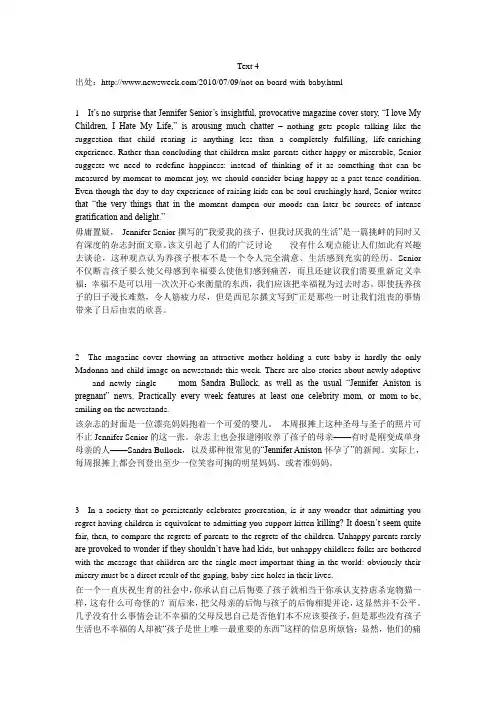
Text 4出处:/2010/07/09/not-on-board-with-baby.html1---It’s no surprise that Jennifer Senior’s insightful, provocative magazine cover story, ―I love My Children, I Hate My Life,‖ is arousing much chatter –nothing gets people talking like the suggestion that child rearing is anything less than a completely fulfilling, life-enriching experience. Rather than concluding that children make parents either happy or miserable, Senior suggests we need to redefine happiness: instead of thinking of it as something that can be measured by moment-to-moment joy, we should consider being happy as a past-tense condition. Even though the day-to-day experience of raising kids can be soul-crushingly hard, Senior writes that ―the very things that in the moment dampen our moods can later be sources of intense gratification and delight.‖毋庸置疑,Jennifer Senior撰写的―我爱我的孩子,但我讨厌我的生活‖是一篇挑衅的同时又有深度的杂志封面文章。
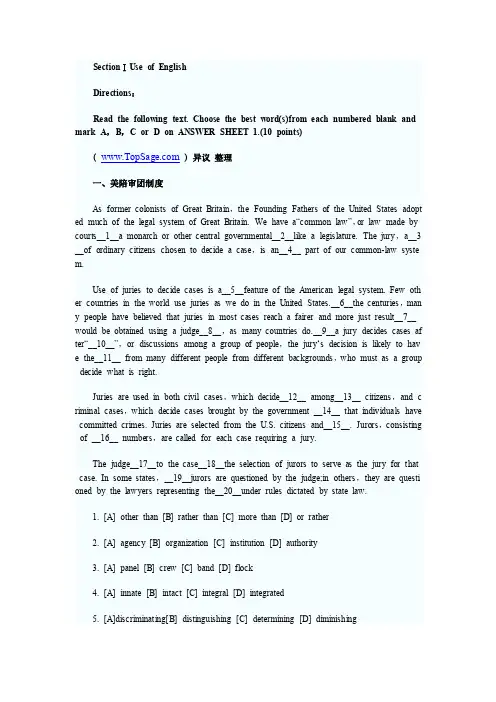
SectionⅠUse of EnglishDirections:Read the following text. Choose the best word(s)from each numbered blank and mark A,B,C or D on ANSWER SHEET 1.(10 points)( ) 异议整理一、美陪审团制度As former colonists of Great Britain,the Founding Fathers of the United States adopt ed much of the legal system of Great Britain. We have a“common law”,or law made by courts__1__a monarch or other central governmental__2__like a legislature. The jury,a__3 __of ordinary citizens chosen to decide a case,is an__4__ part of our common-law syste m.Use of juries to decide cases is a__5__feature of the American legal system. Few oth er countries in the world use juries as we do in the United States.__6__the centuries,man y people have believed that juries in most cases reach a fairer and more just result__7__ would be obtained using a judge__8__,as many countries do.__9__a jury decides cases af ter“__10__”,or discussions among a group of people,the jury…s decision is likely to hav e the__11__ from many different people from different backgrounds,who must as a group decide what is right.Juries are used in both civil cases,which decide__12__ among__13__ citizens,and c riminal cases,which decide cases brought by the government __14__ that individuals have committed crimes. Juries are selected from the U.S. citizens and__15__. Jurors,consisting of __16__ numbers,are called for each case requiring a jury.The judge__17__to the case__18__the selection of jurors to serve as the jury for that case. In some states,__19__jurors are questioned by the judge;in others,they are questi oned by the lawyers representing the__20__under rules dictated by state law.1. [A] other than [B] rather than [C] more than [D] or rather2. [A] agency [B] organization [C] institution [D] authority3. [A] panel [B] crew [C] band [D] flock4. [A] innate [B] intact [C] integral [D] integrated5. [A]discriminating[B] distinguishing [C] determining [D] diminishing6. [A] in [B] by [C] after [D] over7. [A] that [B] which [C] than [D] as8. [A] alike [B] alone [C] altogether [D] apart9. [A] Although [B] Because [C] If [D] While10.[A] deliberations [B] meditations [C] reflections [D] speculations11.[A] outline [B] outcome [C] input [D] intake12.[A] arguments [B] controversies [C] disputes [D] hostilities13.[A] fellow [B] individual [C] personal [D] private14.[A] asserting [B] alleging [C] maintaining [D] testifying15.[A] assembled [B] evoked [C] rallied [D] summoned16.[A] set [B] exact [C] given [D] placed17.[A] allocated [B] allotted [C] appointed [D] assigned18.[A] administers [B] manages [C] oversees [D] presides19.[A] inspective [B] irrespective [C] perspective [D] prospective20.[A] bodies [B] parties [C] sides [D] units答案1. B2. D3. A4. C5. B6. D7.C8.B9. B 10. A11. C 12. C 13.D 14.B 15. D 16. A 17. D 18. C 19. D 20. B总体分析本文介绍了美国的陪审团制度。
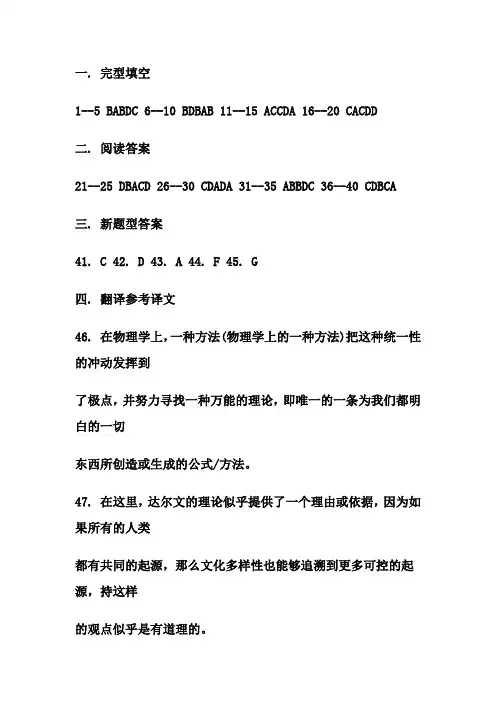
一. 完型填空1--5 BABDC 6--10 BDBAB 11--15 ACCDA 16--20 CACDD二. 阅读答案21--25 DBACD 26--30 CDADA 31--35 ABBDC 36--40 CDBCA三. 新题型答案41. C 42. D 43. A 44. F 45. G四. 翻译参考译文46. 在物理学上,一种方法(物理学上的一种方法)把这种统一性的冲动发挥到了极点,并努力寻找一种万能的理论,即唯一的一条为我们都明白的一切东西所创造或生成的公式/方法。
47. 在这里,达尔文的理论似乎提供了一个理由或依据,因为如果所有的人类都有共同的起源,那么文化多样性也能够追溯到更多可控的起源,持这样的观点似乎是有道理的。
48. 从我们的共性中过滤出独特性能够让我们理解复杂的文化行为是怎样出现的,以及用进化或认知的概念来说,是什么在引导这种文化行为。
49.由约华格林伯根提出的第二个观点,采取了一个更为经验主义的普遍性方法,识别出了许多语言所共有的特征(特别是词序方面),这些特征被认为是代表了由认知限制所造成的偏见。
50. 乔姆斯基的语法应该说明了语言变化的模式,这些模式和语言这个家族或通过这个家族所追溯的这个路径是无关的,而格林伯根的普遍性预测了某些特定词序关系之间紧密的相互依赖性。
五. 作文参考范文51. 小作文参考范文(参见作文冲刺班课程授课内容和讲义第24页写法)Dear my friends,I am writing this letter to welcome you to our university on behalf of our Students’ Union. I expect you to arrive here with increasing joy as well as excitement. It is of great pleasure to anticipate your coming soon.As foreign students, you will find everything on our campus quite different, fresh and alien. Therefore, after arriving, you can take full advantage of every opportunity to communicate with us directly to bridge the gap. To be more specific, the climate in Beijing is considerably different from your hometown, but you will soon get accustomed to living here. Finally, I hope to accompany you and introduce some special or unique campus characteristics and cultures so as to let you be better acquainted with/understand our campus life.We shall strive to make your stay or visit as pleasant as possible by providing the best service as well as support for you. All of our students are looking forward to your early coming eagerly.Yours sincerely,Li Ming52. 大作文 Sample WritingAs is apparently drawn in this miniature, in the middle stand two individuals, one feeling gloomy while the other optimistic. The Chinese characters above inform our readers of the message that various folks take different attitudes toward the same event. (参见黄涛冲刺班作文讲义第8页第一段首句必杀句型)How impressive this drawing seems to be in depicting one of the most prevalent themes that attitudes make everything in our life.After careful reflection and mediation, we examinees come to understand the enlightening drawing. I contend that this thought-provoking image conveys one profound layer of implication concerning attitude or optimism. It is universally acknowledged that life is by no means perfect and whether we feel optimistic or not depends on what attitudes we take. (参见黄涛冲刺班讲义第3页作文经典句型必备)When confronted with an adverse situation, some youths feel in low spirits and fall into depression. Others, on the contrary, look at the positive side of the situation and remain cheerful. As a consequence, it is our attitude rather than the situation itself that determines how we feel. (参见启航冲刺讲义第13页第30个段落正反论证法)In my personal sense, the message applies to our youths especially. In such a rat-race society, everyone is bound to encounter hardships and difficulties. In this sense, I should keep an optimistic attitude to pullthrough any hardship. Just as a famous figure puts it, it is our attitude that has changed everything in our life. (参见作文冲刺讲义第7页作文九大高分句式之引用名人名言)更多经典高分句型可以参考40页的黄涛作文冲刺资料,按照自己喜欢的背诵的高分句子来造就自己的高分作文。
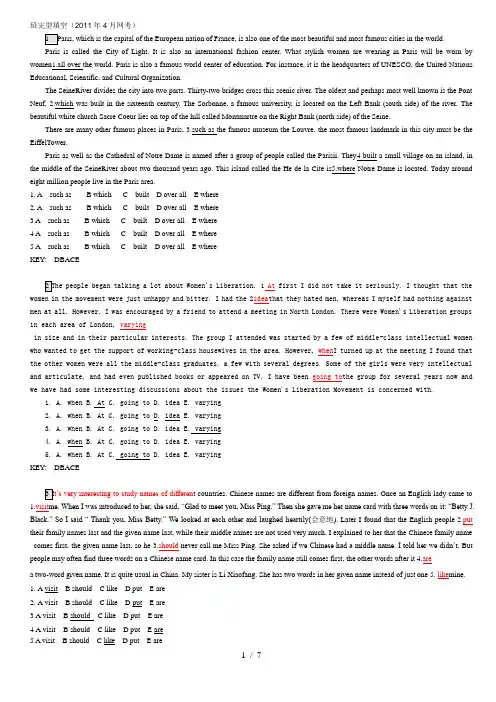
班完型填空(2011年4月网考)Paris is called the City of Light. It is also an international fashion center. What stylish women are wearing in Paris will be worn by women1.all over the world. Paris is also a famous world center of education. For instance, it is the headquarters of UNESCO, the United Nations Educational, Scientific, and Cultural Organization.The SeineRiver divides the city into two parts. Thirty-two bridges cross this scenic river. The oldest and perhaps most well known is the Pont Neuf, 2.which was built in the sixteenth century. The Sorbonne, a famous university, is located on the Left Bank (south side) of the river. The beautiful white church Sacre Coeur lies on top of the hill called Montmartre on the Right Bank (north side) of the Seine.There are many other famous places in Paris, 3.such as the famous museum the Louvre, the most famous landmark in this city must be the EiffelTower.Paris as well as the Cathedral of Notre Dame is named after a group of people called the Parisii. They4 built a small village on an island, in the middle of the SeineRiver about two thousand years ago. This island called the He de la Cite is5.where Notre Dame is located. Today around eight million people live in the Paris area.1. A such as B which C built D over all E where2. A such as B which C built D over all E where3 A such as B which C built D over all E where4 A such as B which C built D over all E where5 A such as B which C built D over all E whereKEY: DBACEThe people began talking a lot about Women's Liberation. 1 At first I did not take it seriously. I thought that the women in the movement were just unhappy and bitter. I had the 2idea that they hated men, whereas I myself had nothing against men at all. However, I was encouraged by a friend to attend a meeting in North London. There were Women's Liberation groups in each area of London, varyingin size and in their particular interests. The group I attended was started by a few of middle-class intellectual women who wanted to get the support of working-class housewives in the area. However, when I turned up at the meeting I found that the other women were all the middle-class graduates, a few with several degrees. Some of the girls were very intellectual and articulate, and had even published books or appeared on TV. I have been going to the group for several years now and we have had some interesting discussions about the issues the Women's Liberation Movement is concerned with.1. A. when B. At C. going to D. idea E. varying2. A. when B. At C. going to D. idea E. varying3. A. when B. At C. going to D. idea E. varying4. A. when B. At C. going to D. idea E. varying5. A. when B. At C. going to D. idea E. varyingKEY: DBACEt’s very interesting to study names of differen t countries. Chinese names are different from foreign names. Once an English lady came to 1.visit m e. When I was introduced to her, she said, “Glad to meet you, Miss Ping.” Then she gave me her name card with three words on it: “Betty J. Black.” So I said “ Thank you, Miss Betty.” We looked at each other and laughed heartily(会意地). Later I found that the English people 2.put their family names last and the given name last, while their middle names are not used very much. I explained to her that the Chinese family name _comes first, the given name last, so he 3.should never call me Miss Ping. She asked if we Chinese had a middle name. I told her we didn’t. But people may often find three words on a Chinese name card. In this case the family name still comes first, the other words after it 4.area two-word given name. It is quite usual in China. My sister is Li Xiaofang. She has two words in her given name instead of just one 5. like mine.1. A visit B should C like D put E are2. A visit B should C like D put E are3 A visit B should C like D put E are4 A visit B should C like D put E are5 A visit B should C like D put E areKEY: ADBECis always interesting to vis it another country, especially for those who have never traveled a great deal. Foreign travel can be very educational for everyone if he is interested enough to make preparations beforehand. Learning the language of the new country would be difficult for the traveler, 1.but the benefits of such an effort would become obvious immediately 2.on his travel. It may not seem important to him when he comfortably stays at home, but knowing how to order a meal or rent a room is necessary for the newcomer in a strange country. Without knowing the language, it is very difficult 3.for the stranger to understand the people of the new country and their customs.To be sure, he can see places and things4.without the use of a language, but places and things are not the heart of any country. To get the greatest benefit from a trip to another country, it is 5.how important for the visitor to have an understanding of the language.1. A to B on C without D but E for2. A to B on C without D but E for3. A to B on C without D but E for4. A to B on C without D but E for5. A to B on C without D but E forKEY: DBECArsity lectures to be a confusing and frustrating experience. The lecturer speaks for one or two hours, perhaps __1__ the talk with slides, writing up important information on the blackboard, distributing reading material and giving out assignment .The new student sees the other students continuously writing on notebooks and 2_ what to write. Very often the student leaves the lecture with notes which do not catch the main points and which become hard even for the students to understand.Most institutions provide courses which assist new students to develop the skills they need to be effective listeners and note-takers. If these are unavailable, there are many useful study-skills guides which 3.enable learners to practice these skills independently.In all cases it is important to tackle the problem before actually starting your studies. It is important to acknowledge that most students have difficulty in acquiring the language skills required in college study. One way of 4.overcoming these difficulties is to attend the language and study-skills classes which most institutions provide throughout the academic year. Another basic strategy is to find a study partner 5. with whom it is possible to identify difficulties, exchange ideas and provide support.1. A so B sorry C for D pleased E jacket2. A so B sorry C for D pleased E jacket3. A so B sorry C for D pleased E jacket4. A so B sorry C for D pleased E jacket5. A so B sorry C for D pleased E jacketKEY: EBCAD6 There were no classes that afternoon, so Henry went to a clothingshop near his home. The shop sold many jackets. He looked1 fort hem and at last chose a very nice one. He tried it on and then told the shop-keeper to put it into a bag. At that time his friend Bruce came into the shop. They hadn’t s een each other for a long time. They were so 2pleased to meet again that they forgot everything else. Soon they were busy talking on and on happily.It was nearly six o' clock,3.so they decided to go and have dinner together. Henry picked up the bag, and walked to the door of the shop. The shopkeeper stopped them and asked Henry to pay for the jacket Henry looked at him in surprise at first, but soon he remembered that he hadn't paid for it. He said 5sorry, gave him the money and then left the shop with his friend.1. A so B sorry C for D pleased E jacket2. A so B sorry C for D pleased E jacket3. A so B sorry C for D pleased E jacket4. A so B sorry C for D pleased E jacket5. A so B sorry C for D pleased E jacketKEY: CDAEB加热)water, warm houses, give light and cook food. But fire can burn things,1 too. It can burn trees, houses, animals, or people.Nobody knows for sure how people began to use fire. But there are a lot of interesting storiesabout the first time a man or a woman started a fire. One is 2.abou t a man. He lived a very , very long time ago. He went up to the sun by a rope and brought fire down.Today people know how to make a fire with matches. Children sometimes 3.like to play with them. But matches can be very dangerous. One match can burn a piece of paper, and then it might burn a house. A small fire can become a big fire very fast. Fire kill many people every year. So you4.mus t be careful with matches.Be careful with fire, and it will 5. help you. Be careless with fire, and it will burn you.1. A too B about C must D help E like2. A too B about C must D help E like3. A too B about C must D help E like4 A too B about C must D help E like5. A too B about C must D help E likeKEY: ABECDA very new, young officer was at a railway station. He was on his way to visit his mother in 1.another town. He wanted to telephone her to tell her the time of his train, so that she could meet him at the station in her car. He looked at all his pockets, but 2.found that he did not have the right money for the telephone, so he went on and looked 5 for someone to help him. At last an old soldier came by, and the young officer stopped him and said, “Can you change the money 3.for me?”“Wait a moment,” the soldier answered, and he began to put his hand in his pocket “I’ll see whether I can help you.”“Don’t you know how to speak to an officer?” the young officer said angrily “Now let’s 4 start again, Can you change the money for me?”“No, sir,” the old soldier answered 5_quickly__1. A start B found C quickly D for E another2. A start B found C quickly D for E another3. A start B found C quickly D for E another4. A start B found C quickly D for E another5. A start B found C quickly D for E anotherKEY: EBDAC’t know London very well. One day, she goes to London, but she can’t find her 1 . Just then, she sees a man near the bus stop. “ I can ask him the way.” she says to 2.. Then she goes over to the man and asks,“ Excuse me, will you please tell me the way to King Street?” The man smiles with no answer. He doesn’t know English. He speaks Russian (俄语). He is a visitor (游客). Then he 3 his hand into his pocket(衣袋),takes out a piece of paper and lets her 4 it. On the paper are these words, “ Sorry, I can’t speak English..”1. A way B puts C herself D takes out E look out2. A way B puts C herself D takes out E look out3 A way B puts C herself D takes out E look out4 A way B puts C herself D takes out E look out5 A way B puts C herself D takes out E look outKEY: ACBDEcan't get there 3as .You can go there by bus. It'll take you hours to get there 4sign foot." "What's wrong with her?" Tony thought,"I can see Benny's house from here now. It's behind the trees ."Then Tony walked to the other side of the trees. He found the old woman was 5 before.There was a river in front of him, and he couldn't see a boat. The house was on the other side of the river.1 A before C as D that E sign2 A before B impossible C as E sign3 A before B impossible C as D that E sign4 A before B impossible C as D that E sign5 Abefore B impossible C as D that E signKEY: BDCE11 Monday is the beginning of the week. It is the day most Americans like worst. The day they like most is Saturday. Saturday is the end of the workweek, it is the beginning of the weekend.Life is 2 on the weekend, most American take care of their houses, cars and gardens, They sleep later at the night. They engoy the feeling that time ---to move slowly.The workweek is for things you 4.–to do, the weekend is for things you like to do. Some people may get in a car for a 5 in the country. They like to take part in a sports activity out of doors. And on Saturday night they might go to public eating places or a film.1. A like B drive C have D different E seems2. A like B drive C have D different E seems3. A like B drive C have D different E seems4. A like B drive C have D different E seems5. A like B drive C have D different E seemsKEY: ADECB12Michel is a young girl who works for the police 1 a handwriting expert (专家). She has helped catch many criminals (罪犯) by using her special talents (天才).13When she was fourteen, Michel was already so interested in the differences in her friends' handwriting that she would spend hours studying them. After finishing college she went to France for a special two-year class in handwriting at the School of Police Science.14Michel says that it is 2 for people at hide their handwriting. She can discover most of what she needs to know simply by looking at the writing with her own eyes, but she also has machines 3 help her make out different kinds of paper and ink. This knowledge is often of great help to the police.15Michel believes that handwriting is a good 4 of what kind of person the writer is. "I wouldn't go out with a fellow if I didn't like his handwriting. " She says. But she adds she fell in love with her future husband, a young policeman 5 she studied his handwriting. It is later proved to be all right , however.1617 1. A before B impossible C as D that E sign18 2. A before B impossible C as D that E sign19 3. A before B impossible C as D that E sign20 4 A before B impossible C as D that E sign5 Abefore B impossible C as D that E sign2122参考译文:米歇尔是一个为警方工作的笔迹鉴别专家,她用她的天赋帮忙抓到了很多罪犯。

2011英语一Text4It’s no surprise that Jennifer Senior’s insightful1, provocative2magazine cover story, “I love My Children, I Hate My Life,” is arousing much chatter—nothing gets people talking like the suggestion that child rearing3 is anything less than a completely fulfilling, life-enriching experience4. Rather than concluding that children make parents either happy or miserable5, Senior suggests we need to redefine6happiness: instead of thinking of it as something that can be measured7 by moment-to-moment joy, we should consider being happy as a past-tense condition8. Even though the day-to-day experience of raising kids can be soul-crushingly9 hard, Senior writes that “the very things that in the moment dampen10our moods can later be sources of intense gratification11 and delight12.”The magazine cover showing an attractive mother holding a cute13 baby is hardly the only Madonna-and-child image on newsstands14this week. There are also stories about newly adoptive—and newly single–mom Sandra Bullock, as well as the usual “Jennifer Aniston is pregnant15” news. Practically every week features16 at least one celebrity17 mom, or mom-to-be, smiling on the newsstands.In a society that so persistently18 celebrates procreation19, is it any wonder that admitting you regret having children is equivalent20 to admitting you support kitten-killing? It doesn’t seem quite fair, then, to compare the regrets of parents to the regrets of the children. Unhappy parents rarely are provoked21to wonder if they shouldn’t have h ad kids, but unhappy childless folks22are bothered with the message that children are the single most important thing in the world: obviously their misery23 must be a direct result24 of the gaping baby-size holes25 in their lives.Of course, the image of parenthood that celebrity magazines like Us Weekly and People present is hugely unrealistic26, especially when the parents are single mothers like Bullock. According to several studies concluding that parents are less happy than childless couples, single parents are the least happy of all. No shock there, considering how much work it is to raise a kid without a partner to lean on27; yet to hear Sandra and Britney tell it, raising a kid on their “own” (read: with round-the-clock help) is a piece of cake.It’s hard to imagine that many people are dumb28 enough to want children just because Reese and Angelina make it look so glamorous29: most adults understand that a baby is not a haircut. But it’s interesting to wonder if the images we see every week of stress-free, happiness-enhancingparenthood30aren’t in some small, subconscious31 way contributing to our own dissatisfactions32 with the actual experience, in the same way that a small part of us hoped getting “the Rachel” might make us look just a little bit like Jennifer Aniston.36. Jennifer Senior suggests in her article that raising a child can bring________.[A] temporary33 delight[B] enjoyment in progress[C] happiness in retrospect34[D] lasting reward3537. We learn from Paragraph 2 that________.[A] celebrity moms are a permanent source for gossip36[B] single mothers with babies deserve greater attention[C] news about pregnant celebrities is entertaining37[D] having children is highly valued by the public38. It is suggested in Paragraph 3 that childless folks________.[A] are constantly exposed to38 criticism[B] are largely ignored by the media[C] fail to fulfill their social responsibilities[D] are less likely to be satisfied with39 their life39. According to Paragraph 4, the message conveyed by celebrity magazines is________.[A] soothing40[B] ambiguous41[C] compensatory42[D] misleading40. Which of the following can be inferred from the last paragraph?[A] Having children contributes little to the glamour43 of celebrity moms.[B] Celebrity moms have influenced our attitude towards child rearing.[C] Having children intensifies44 our dissatisfaction with life.[D] We sometimes neglect45 the happiness from child rearing.【干货笔记】1. insightful adj. 富有洞察力的,有深刻见解的2. provocative adj. 挑衅的,煽动性的;挑逗的,激发性欲的;引发思考的,启发性的3. child rearing 育儿4. a completely fulfilling, life-enriching experience 一个完全令人满意的,丰富的生活经历5. miserable adj. 痛苦的,使人难受的;(人)乖戾的,总是抱怨的;少得可怜的,太少的;糟糕的,差劲的6. redefine v. 重新定义,重新界定7. measure v. 测量;(指尺寸、长短、数量等)量度为;估量,判定n. 措施; 方法; (一定的)量; 尺度; 标准; 程度; 判断; 度量单位8. past-tense condition 过去时条件tense adj. 紧张的; 担心的; 不能松弛的; 令人紧张的n. (动词的) 时; 时态9. soul-crushingly 令人抓狂的,让人崩溃的,震撼人心的crushingly adv. 让人受不了地;过分地10. dampen v. 使潮湿,弄湿;减弱,抑制11. gratification n. 满足,令人喜悦的事物12. delight n. 高兴;令人高兴的人或物,乐事v. 使高兴;以…为乐13. cute adj. 可爱的; 漂亮迷人的; 有性吸引力的; 性感的; 精明的14. newsstand n. 报摊;杂志摊15. pregnant adj. 怀孕的,妊娠的;意味深长的,意义重大的16.【特点,特征,特性】①feature n. 特点,特征;五官,面貌(特征);地貌;特写,专题节目;v. 以…为特色,以…为主要组成;起重要作用,占重要地位;放映,上演;担任主演②characteristic n. 特点,特征③ distinctiveness n. 独特性,特色④Uniqueness n. 独特性17. celebrity n. 名声,名望;名人,明星18. persistently adv. 坚持地;固执地19. procreation n. 生殖;生产20. equivalent adj. 相等的; (价值、数量、意义、重要性等)相同的n. 相等的东西; 等量; 对应词21. provoke v. 激起,引起;激励,刺激;挑衅,激怒22. folk n. 人们;家人,双亲;民间音乐;诸位,大伙儿adj. 民俗的,传统的;流传民间的,普通百姓的23. misery n. 痛苦,苦难;穷困,悲惨境遇;24. direct result 直接结果25. gaping baby-size holes 小型的漏洞gaping adj.(洞)豁开的;(伤口)敞开的;(嘴巴)张大的26. unrealistic adj. 不切实际的;不实在的27. lean on 靠在…上;依赖28. dumb adj. 哑的,不肯开口的; 愚蠢的; 笨的29. glamorous adj. 迷人的; 特别富有魅力的; 富于刺激的; 独特的30. stress-free, happiness-enhancing parenthood 无压力、幸福感增强的父母身份parenthood n. 做父母的身份31. subconscious adj. 下意识的; 潜意识的n. 下意识; 潜意识32. dissatisfaction n. 不快; 不悦; 不满意33. temporary adj. 暂时的; 临时的; 短暂的n. 临时工; 临时雇员34. retrospect n. 回顾,回想v. 回顾,追溯35. lasting reward 持久的回报36. gossip n. 闲聊, 流言蜚语,小道消息;v. 闲聊37. entertaining adj. 使人愉快的,娱乐性的n. 招待客户,宴请v. 使有兴趣,使快乐;心存,怀有(想法、希望、感觉等);招待,请客(entertain 的现在分词形式)38. be constantly exposed to 经常暴露于39. be satisfied with 满意40. soothing adj. 安慰的,使人平静的;舒缓的,镇痛的v. 安慰,使平静;减轻,缓和(疼痛);使(身体部位)舒缓(soothe的现在分词)41. ambiguous adj. 模棱两可的,有歧义的;不明朗的,不确定的42. compensatory adj. 赔偿的;弥补的,补偿的43.【吸引】① absorb v. 吸收,吸引absorption n. 吸收;吸引be absorbed in… 被…吸引the absorption of immigrants into American society 把移民吸收进美国社会② attract v. 吸引attractive adj. 有魅力的;引人注目的;迷人的;招人喜爱的attractiveness n. 吸引力attraction n. 吸引;吸引力;有吸引力的人或事物(glamour/glamor n.,魔力;魔法;魅力)③ lure v. 引诱④ tempt v. 引诱;诱惑be tempted to do … 被诱惑去做…⑤glamour n. 吸引力,诱惑力,魅力;迷人的美,奢华;v. 迷住,迷惑44. intensify v. 加剧;强化;使尖锐45. neglect v. 不予重视,忽视;疏于照顾,未予看管;漏做n. 忽略,忽视,未被重视。
中考英语完形填空&填词分析:年份年份及难度星级2009年☆☆☆☆2010年☆☆☆☆2011年☆☆☆2012年☆☆☆分值25分15分15分15分篇数2篇1篇1篇1篇字数第一篇157字第二篇385字320字332字302字题材生活故事(邻居,士兵做汤)人物生活(爱拍照的人)生活故事(残疾孩子母亲的经历)教育性故事(孩子面对失败)从上表我们可以得出以下结论:1.考查方式渐渐固定:从2009年以后都是每年考查1篇,15小题,300字左右。
2.题材固定在生活故事上:完型在选材时注重选择与孩子们生活很接近的文章,比如,校园事件,故事,社区事件,故事,名人励志故事和社会热点大事。
3.难度适中:2010年的文章最难。
一般情况下文章不会太难,读懂没有问题,但要选出正确的选项还是需要仔细推敲的。
4.重视词汇和上下文关联:对孩子们基础词汇的要求较高,要求孩子熟知基础词汇的用法,近义词区别,固定搭配及其基础词汇另外的特殊含义。
另外,在做题过程中要学会根据上下文来推测答案,有时在文中甚至可以找到原词,所以遇到不会的题目不必害怕,做好记号,沉着应对。
Tips:1、做题顺序:一定是先快速浏览文章,再做题。
浏览文章需达到的目标:(1)了解文章的大概主题(第一句话,第一句话一定不会设空)(2)了解文章行文思路(注意转折等地方)2、当达到炉火纯青的地步时,应该能够看到文章,不看选项就知道填什么词。
在选择选项时直奔自己先前脑海中跳出的词语,这样可以跳过各个选项的陷阱。
完型填空主要测验学生的语言综合运用能力,包括基础知识的掌握和运用,对整个文章逻辑联系的理解,在情景中辨析词义的能力以及词组短语搭配的使用能力,这是大部分考生认为难度最大的考查项目。
有些考生的听力基础知识部分做的还比较好,但是完型填空却只能做对一两道,有的甚至对完型填空产生了恐惧心理,导致全军覆没。
其实只要我们有信心,有良好的心理素质,再加上一定的技巧,完型填空并不是不可逾越的鸿沟。
2011-2012年中考完形填空答案解析(精选5篇)第一篇:2011-2012年中考完形填空答案解析2011年中考完形填空答案解析阅读下面短文,掌握其大意,从各题所给的A、B、C、D四个选项中,选出一个最佳答案。
I didn’t cry when I learned I was the parent of a disabled child.I just sat still and didn’t say anything.When Jenny was old enough,I sent her to a kindergarten(幼儿园).On the first morning,Jenny spent hours playing by herself.It seemed that she felt very41.However, to my joy, Jenny’s classmates always42her,”You got all your spelling words right today!”In fact,her spelling list was ter,she faced a very painful44——at the end of the term,there was a game which had45to do with physical education.But Jenny was46in it.My husband and I were anxious about the day.I wanted to let my child stay home!But my heart wouldn’t let me off that easily.So I47a pale,unwilling Jenny onto the school bus.At the kindergarten, I was quite worried because of her48action,Jenny would probably hold up her team.The game went well until it was time for the sack(麻袋)race.Surely Jenny would find it49.Now each child had to climb into a sack,jump to the finishing line,return and climb out of the sack.I noticed Jenny standing near the end of her line of players.But as it was her turn to join, a change took place in her50.The tallest boy behind Jenny placed his hands on her waist(腰).Two other boys51in front her.The moment the player before Jenny stepped out from the sack,the two boys52the sack suddenly and kept it open while the tall boy lifted Jenny and53her into it.A girl nearby took her hand and supported her54Jenny got her balance.Then she jumped forward,smilingand proud.In the cheers of the teachers,schoolmates and parents,I silently thanked the warm, understanding people in life who made it55for my disabled daughter to be like her fellow human beings.Then I finally cried.【主旨大意】本文作者讲述了她的女儿Jenny读幼儿园时,在她的朋友的帮助下,摆脱了自卑心理,像别人一样快乐生活的故事。
复习题11、碳碳双键的键能大于碳碳单键的键能,小于2倍的碳碳单键的键能。
( )2、化学反应的恒容反应热不是状态函数,但它与途径无关。
()3、298.15K时,反应Ag+(aq)+Cl-(aq) → AgCl(s) 的Δr H mθ等于Δf H mθ(AgCl,s,298.15K)。
()4、稳定单质在298.15K时的标准摩尔生成焓和标准熵均为零。
()5、CO2和SO2化学组成相似,空间构型也相似。
( )6、某反应的Kθ =2.4×1034,表明该反应在此温度下可在极短时间内完成。
()7、在一定温度下,渗透压较大的水溶液,其蒸气压也一定较大。
()8、H原子中下列能级的顺序如下:3s<3p<4s<3d 。
()9、催化剂只能改变反应到达平衡的时间,但不能改变反应方向。
()10、胶体中胶粒的电荷正负与反离子电荷相反。
()11、相同质量摩尔浓度的下列物质的水溶液,凝固点最低的是()。
A. HAcB. NaClC. CaCl2D. C6H12O612、由0.02mol•L-1Pb(NO3)2和0.02mol•L-1 KI溶液等体积混合制备的PbI2溶胶,往此溶胶中加入相同浓度的下列电解质溶液,对此溶胶凝结能力最强的是()。
A. AlCl3B. Mg(NO3)2C. Na3PO4D. K4[Fe(CN)6]13、CH3OH 与H2O之间存在哪些分子间作用力?()A. 色散力B. 色散力与诱导力C. 色散力、诱导力与取向力D. 色散力、诱导力、取向力与氢键14、反应2 NO + Cl2→ 2 NOCl为基元反应,那么该反应的速率方程式与反应级数分别为()。
A. V = k• c2 (NOCl) 2和2B. V = k• c2 (NO) c(Cl2) 和3C. V = k• c(NO) c(Cl2) 和2 D . V = k• c(NO) c(Cl) 2和315、化学反应2A(g)+ 2B(s)= C(g)+ 3D(s)是放热反应,下列说法正确的是()。
2012年考研英语(一)完型填空答案和原文出处2012年考研英语(一)完型填空答案和原文出处一、答案1. C2. A3. B4. D5. C6. A7. B8. A9. C 10. D11. B 12. D 13. A 14. C 15. B16. D 17. A 18. C 19. D 20. B二、原文出处以下是完型填空部分的原文出处。
原文:(1) For as long as capitalistic industrial processes have been in place, businesses have sought to get the maximum amount of 21 from their employees while spending the least amount of 22 on them.(2) During the industrial revolution, 23 men and women worked under terrible conditions for little pay.(3) The current push to increase productivity resembles that era.(4) Americans now work 164 more hours per year than they did in 1970, on 25 of new technologies that were supposed to reduce workloads.(5) Moreover, in the 20 years following 1990, 26 per capita rose by 45%, but salaries for college graduates only increased by 10%.(6) Companies claim they are 27 their best through improved efficiency, but trying to squeeze more work from fewer employees is taking its 28 .(7) Studies have shown that overwork can be 29 to both physical and mental health, as well as personal relationships.(8) The consequences of 30 are alarming, with skyrocketing stress levels leading to a host of health problems, 31 , and even death.(9) It is time for businesses to start 32 the wellbeing of their employees as essential to their own success.(10) Investing in 33 employees not only improves their quality of life, but also improves their productivity and loyalty.(11) It is a win-win situation for both workers and businesses.(12) By providing better work conditions, reasonable workloads, and fair pay, businesses can 34 the negative impacts of overwork.(13) When employees are well taken care of, they will be more focused, motivated, and efficient in their work.(14) This will ultimately contribute to the overall success and longevity of the business.(15) It is time to prioritize the 35 of employees and create a healthier work-life balance.原文出处:2012年考研英语(一)真题,完型填空第7题到第21题。
考研真题词汇近义词辨析abnormal, uncommonabnormal [æb'nɔ:məl] adj. 反常的, 不正常的, 不规则的n. 不正常的人[记]ab-远离,normal 正常,远离正常的—反常的;[英]Someone or something that is abnormal is unusual, especially in a way that is worrying. [解]强调“反常的、不太正常的”甚至接近“诡异和令人担忧”的状态[搭] abnormal psychology变态心理学;abnormal amounts of rain 反常的降雨量abnormal circumstances 反常的境况abnormal phenomenon 反常的现象abnormal weather 反常的天气uncommon[ʌn'kɔmən] adj. 不寻常的, 不凡的, 罕有的[记]un-不,common平常的、普通的、共同的—不平常的,不常见的[英] ○1If you describe something as uncommon, you mean that it does not happen often or is not often seen.○If you describe a quality, usually a good quality, as uncommon, you mean that it is unusually great in degree or amount.[解]uncommon强调的事某个事情“不常见,不常发生”或者是“某个物品的质量非常好、非凡的、出色的”。
它并没有和abnormal那样强调“反常、不正常的”[搭] an uncommon degree罕见的程度Uncommon occurrence 罕见的事情a b ide, adhere, conform, complyabide [əˈbaid] vt.遵守,容忍,坚持[记] a-不,bid-命令、竞标—不抵抗命令,你要遵守;不许你竞标,你要忍着[英] if you abide by something,you do what you are told.[解] abide 通常表示遵守“决定、裁决、法规”等,与介词by搭配;还表“忍受,容忍”[搭] abide by the decision 遵守某个决定abide by the rules 遵守条律abide by the judgment 遵守裁决adhere[ədˈhiə] vi. 遵守,粘附,附着;,坚持;追随,支持[记]ad-去,here-这;去这里,到此地—必须遵守[英]○1If you adhere to a rule or agreement, you act in the way that it says you should.○2I f you adhere to an opinion or belief, you support or hold it.[解] 也表示遵守,强调遵守“法规、协约”;也会考到“遵照某个意见和某种信仰”,常常和介词to搭配[搭] adhere to the principle 遵守某个原则adhered to the contract/rule/agreement/opinion 遵守合同、法规、协约、意见conform [kənˈfɔ:m]vi.(to/with)遵守,适应;相似,一致,符合[记] con-共同。
Form形式—形成共同的形式,大家都遵守[英] If something conforms to something such as a law or someone's wishes, it is of the required type or quality.[解] conform 强调的是遵守法律,符合(遵照)某人的意愿,通常和介词to搭配,也有和with搭配的情况[搭] conform to the rules/ regulations 遵守规则conform to reality 符合现实conform to the traffic laws 遵守交通法规conform to the customs of society. 遵守社会习俗。
Comply [kəmˈplai]vi.(with)遵从,依从,服从[记] com-共同,ply-play玩;要“一起玩”,就必须“遵守”游戏规则![英] If someone or something complies with an order or set of rules, they are in accordance with what is required or expected.[解] comply通常和介词with搭配,这和abide,adhere,conform都是不同的,且comply通常用在较为正式的场合。
[搭] comply with the request 遵照要求comply with the Requirements 符合(遵守)要求comply with the law. 遵守法规comply with your wishes 符合你的意愿comply with the instruction 遵照说明、指导abs tract, digest, outline, summaryabstract [ˈæbstrækt] n.摘要vt.摘要,提取;a.抽象(派)的[记]abs-远离。
Tract = drag 拉—拉出来的东西,摘要[英] An abstract of an article, document, or speech is a short piece of writing that gives the main points of it.[解] 通常abstract是对文章、文件、学术论文或者演讲者说的话的简述;做形容词表示“抽象的、非具体的”[搭] an abstract of the book 这本书的摘要An abstract of the article 这篇文章的摘要An abstract of one’s lecture 讲座的摘要digest[daidʒest] n.文摘;vt.消化;吸收,领悟[记] ge的发音类似“摘”—文摘[英] A digest is a collection of pieces of writing. They are published together in a shorter form than they were originally published.[解] (篇幅较长的)文章或者选集的摘要,它是对原文的浓缩而不是对原文的简单解释,浓缩后仍保持原文的顺序、重点和风格。
[搭] digest of the week's news 本周新闻摘要Reader's Digest《读者文摘》Market Information Digest(MID) 市场资讯综览outline [ˈautlain]n.提纲;外形,略图vt.概述;描…外形[记] out-外,line线条——外面的线条,轮廓,提纲[英] An outline is a general explanation or description of something.[解] outline表示的是描述某个东西的大概情况,大纲,概况。
并没有强调归纳性的摘要[搭] the outline of a plan 计划的概要The outline of a report 报告的大纲summary [ˈsʌməri]n.摘要,概要a.即刻的,立即的[记] sum- 总数,也就是总结[英] A summary of something is a short account of it, which gives the main points but not the details.[解] 指用寥寥数语概括文章或者讲话的要点,不考虑原文的风格。
也通常表示“总结”[搭]in summary总的说来,概括起来summary report of the day's events. 一天的事件作了简要的报告absurd, ridiculousabsurd [əbˈsə:d]a.荒谬的,荒唐的(侧重荒唐)[记] “爱不死的”——爱情真的是不死的嘛?荒唐![英] If you say that something is absurd, you are criticizing it because you think that does not make sense.[解] 荒谬的,可笑的,指因不符合常识、违反真理或不合逻辑而令人发笑[搭] an absurd idea 一个荒唐的想法absurd notion 荒唐的想法absurd situation 荒唐/尴尬的处境absurd suggestion 荒谬的建议ridiculous[riˈdikjuləs]a.可笑的,荒谬的(侧重可笑)[记][英] If you say that something or someone is ridiculous, you mean that they are very foolish.[解] 荒唐可笑的,指因为愚昧无知而令人发笑并成为笑柄,含有蔑视成分。
[搭] It's the most ridiculous thing I ever heard in my life.这是我一生中所听说过的最可笑的事情。
accent, tone, dialectaccent[ˈæksənt, ækˈsent]n.口音,腔调;重音(符号) vt.重读[记] “阿婶”的口音很重[英] Someone who speaks with a particular accent pronounces the words of a language in a distinctive way that shows which country, region, or social class they come from.[解] 指的是“口音”,在说某种大家共同使用的语言的时候所发出的地方性语言特征,通常和介词with搭配。
有时会表示“强调”的意思,请看[搭][搭] She spoke with an Irish accent 说话带有爱尔兰口音put the accent on 强调某事tone [təun]n.语气;音调;气度;色调vt.(up)增强[记]未及[英] The tone of a sound is its particular quality.[解] 通常指的是某人说话的语调和音调,而这种语调又能某种程度上显示出人的情绪态度,表示“以什么样的语气,口吻”[搭] He speaks to his baby in soft tones.他用柔和的语调和他的婴儿说话。